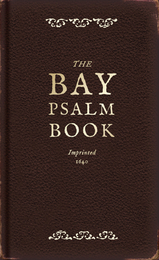2 books about Paraphrases, English

The Bay Psalm Book
A Facsimile
With an Introduction by Diarmaid MacCulloch
Bodleian Library Publishing, 2014
The Bay Psalm Book was the first book to be printed in North America, twenty years after the arrival of the Pilgrims in Massachusetts. Today, only eleven copies are still in existence and fetch as much as fourteen million dollars at auction, making it also the most expensive book in the world.
Originally published in 1640 as The Whole Booke of Psalmes Faithfully Translated into English Metre, the unassuming psalter undertook the translation of Hebrew psalms into English verse for a growing population of New England Puritans unhappy with contemporary translations and in need of a version that would better represent their beliefs. The book became popularly known as The Bay Psalm Book, named after the Massachusetts Bay Colony in which its translators—among them the ministers John Cotton and Richard Mather—lived.
This beautiful facsimile edition of The Bay Psalm Book reproduces one of the best remaining copies of the psalter, including the translators’ preface and the original printer’s errors and binding marks. An introduction by Diarmaid MacCulloch details the book’s place in American religious and cultural history and explains how the psalter came to have such a profound effect on the course of the Protestant faith in America.
Originally published in 1640 as The Whole Booke of Psalmes Faithfully Translated into English Metre, the unassuming psalter undertook the translation of Hebrew psalms into English verse for a growing population of New England Puritans unhappy with contemporary translations and in need of a version that would better represent their beliefs. The book became popularly known as The Bay Psalm Book, named after the Massachusetts Bay Colony in which its translators—among them the ministers John Cotton and Richard Mather—lived.
This beautiful facsimile edition of The Bay Psalm Book reproduces one of the best remaining copies of the psalter, including the translators’ preface and the original printer’s errors and binding marks. An introduction by Diarmaid MacCulloch details the book’s place in American religious and cultural history and explains how the psalter came to have such a profound effect on the course of the Protestant faith in America.
[more]

Once the Buddha Was a Monkey
Arya Sura's "Jatakamala"
Arya Sùra
University of Chicago Press, 1989
Here is one of the most entertaining masterpieces of Sanskrit literature rendered in an English translation that fully captures the original's artistry and charm.
Written most probably in the fourth century A.D., the Jatakamala is generally considered the masterpiece of Buddhist literature in Sanskrit. In elegant, courtly style, Arya Sura retells thirty-four traditional stories about the Buddha in his previous incarnations, human and animal. Whether as a king, a brahmin, a monkey, or a hare, the Great One is shown in assiduous pursuit of virtue and compassion. Though primarily intended as exemplary tales illustrating the Buddhist virtues, these stories also provide a vivid picture of life at a high point in ancient Indian culture—city life in ordinary households or at the royal court, and country life against a backdrop of mountain, desert, and jungle.
Fresh study of the Sanskrit manuscripts, now scattered in libraries all over the world, has enabled Peter Khoroche to make this new translation faithful to the original in both style and content. His explanatory notes will assist student and general reader alike in appreciating this classic from an ancient and exotic civilization.
Written most probably in the fourth century A.D., the Jatakamala is generally considered the masterpiece of Buddhist literature in Sanskrit. In elegant, courtly style, Arya Sura retells thirty-four traditional stories about the Buddha in his previous incarnations, human and animal. Whether as a king, a brahmin, a monkey, or a hare, the Great One is shown in assiduous pursuit of virtue and compassion. Though primarily intended as exemplary tales illustrating the Buddhist virtues, these stories also provide a vivid picture of life at a high point in ancient Indian culture—city life in ordinary households or at the royal court, and country life against a backdrop of mountain, desert, and jungle.
Fresh study of the Sanskrit manuscripts, now scattered in libraries all over the world, has enabled Peter Khoroche to make this new translation faithful to the original in both style and content. His explanatory notes will assist student and general reader alike in appreciating this classic from an ancient and exotic civilization.
“The general reader will be highly grateful for this new translation which, besides being beautifully printed, is rounded off with a very informative and reliable introduction.”—Renate Söhnen-Thieme, Bulletin of the School of Oriental and African Studies
“One would be a fool not to welcome the chance to read this book.”—Richard Gombrich, Journal of the Royal Asiatic Society
“One would be a fool not to welcome the chance to read this book.”—Richard Gombrich, Journal of the Royal Asiatic Society
[more]
READERS
Browse our collection.
PUBLISHERS
See BiblioVault's publisher services.
STUDENT SERVICES
Files for college accessibility offices.
UChicago Accessibility Resources
home | accessibility | search | about | contact us
BiblioVault ® 2001 - 2024
The University of Chicago Press









